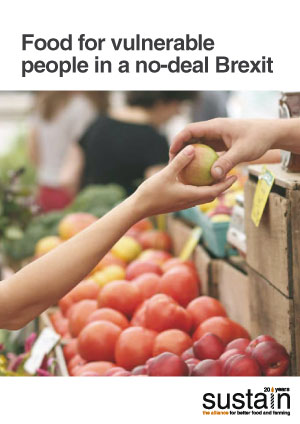Reports • Good Food Trade Campaign
Food for vulnerable people in a no-deal Brexit
September 2019: A call to action on issues that national government, local authorities and Local Resilience Forums need urgently to consider
This briefing focuses on the impact of no-deal Brexit on food supplies for vulnerable people, to inform no-deal Brexit resilience planning by national government, local authorities and Local Resilience Forums.
By “vulnerable people”, we mean those already food insecure or are at risk of becoming so, typically due to low income, disability, infirmity, illness, care responsibilities or personal crisis; with little resilience to predicted no-deal Brexit food price rises or disruption. Additionally, we mean people who rely for all or a significant part of their food on either frontline charities or public-sector institutions. There are likely to be thousands of people in each of the UK’s 45 Local Resilience Forum areas who have low or very low food security – sometimes tens of thousands of people, or hundreds of thousands in the case of larger cities.
Our key concerns are under three themes, with distinct considerations and possible solutions, where people have already been identified as vulnerable and are receiving some level of food support, namely:
- Frontline charities: Such as homeless shelters, domestic violence refuges, school breakfast clubs, holiday hunger projects, drugs rehabilitation and mental health programmes. Many of these groups rely on supply chain surplus food, typically donated by retailers and manufacturers, distributed via the specialist redistribution charity FareShare and by local or regional equivalents.
- Food banks: Local voluntary groups distributing food to people in crisis; food purchased from shops, typically donated by individuals. The Trussell Trust supports a network of more than 1,200 food banks; this makes up around two-thirds of UK food banks, with many more operating independently, as the Independent Food Aid Network records.
- Public-sector institutions: Schools, hospitals, state-run nurseries, care homes, places of detention – food organised in diverse ways, from centralised procurement and outsourcing to large foodservice companies; through to individual institutions managing in-house catering.
The briefing is by the Sustain food and farming alliance, which has been coordinating food aid charities, poverty and health groups and public sector food organisations to express their serious concerns about the possible impact of a no-deal Brexit on food for vulnerable people. It reflects evidence and recommended solutions from food aid professionals and public sector groups who feed millions of vulnerable people each year.
The urgency of need for government action has grown throughout 2019, as the possibility of a no-deal Brexit has increased. Concerns have also grown as information has emerged about the likely ‘reasonable case’ and ‘worst case’ scenarios being considered by government as part of their Yellowhammer no-deal Brexit resilience planning.
Concerns have been further fuelled by statements from food industry associations such as the Food and Drink Federation and British Retail Consortium. Key issues identified include fresh food shortages; delays caused by border checks and freight traffic congestion; unpredictability of availability for ingredients in manufactured foods; likely food price rises of perhaps 6 per cent; and the possibility of food donations to charities drying up. All such circumstances could greatly increase the food insecurity of millions of vulnerable people in the UK.
Published Monday 9 September 2019
Good Food Trade Campaign: Campaigning for good trade that benefits people and the planet at home and overseas.
